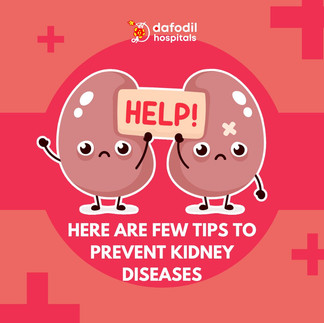World Kidney Day : 9 March
- iSociohub Media
- Mar 8, 2023
- 4 min read
Updated: Mar 9, 2023

World Kidney Day is observed annually on the second Thursday of March. This year, it falls on March 9, 2023. The day is celebrated to raise awareness about the importance of kidney health and the increasing incidence of kidney disease worldwide. The theme for World Kidney Day 2023 is "Living Well with Kidney Disease."
Kidney disease is a silent killer. It often goes undetected until it reaches an advanced stage, leading to kidney failure and the need for dialysis or transplantation. The main risk factors for kidney disease include diabetes, high blood pressure, obesity, smoking, and a family history of kidney disease.
The kidneys are vital organs that filter waste products from the blood and regulate fluid and electrolyte balance in the body. When the kidneys fail, waste products accumulate in the blood, causing various health problems such as high blood pressure, anemia, bone disease, and nerve damage. Kidney failure can also affect other organs such as the heart, lungs, and brain.
Importance of World Kidney Day:
World Kidney Day is an important global event that aims to raise awareness about kidney health and promote the prevention and management of kidney disease. There are several reasons why World Kidney Day is so important:
High Prevalence of Kidney Disease: Kidney disease is a global health issue that affects millions of people. According to the World Kidney Day campaign, one in ten people worldwide has some form of kidney damage. This highlights the urgent need for increased awareness and action to prevent and manage kidney disease.
Low Awareness: Many people are unaware of the risks and consequences of kidney disease. World Kidney Day provides an opportunity to educate the public about the importance of kidney health and the steps they can take to protect their kidneys.
Early Detection: Early detection of kidney disease is crucial for effective treatment and management. World Kidney Day promotes the importance of regular kidney function testing, especially for high-risk populations such as those with diabetes and hypertension.
Health Equity: Kidney disease disproportionately affects vulnerable populations, including low-income communities, racial and ethnic minorities, and people living in rural areas. World Kidney Day highlights the need for health equity in kidney care and the importance of access to quality care for all.
Prevention Tips for Healthy Kidney :
To prevent kidney disease, it is essential to maintain a healthy lifestyle. This includes eating a balanced diet, staying physically active, managing stress, avoiding smoking and excessive alcohol consumption, and maintaining a healthy weight. Regular screening for kidney disease is also important, especially for people at high risks, such as those with diabetes, high blood pressure, or a family history of kidney disease.
Kidney disease is a serious health issue that can have a significant impact on a person's quality of life. The good news is that kidney disease is largely preventable through simple lifestyle changes. Here are some preventive tips to keep your kidneys healthy:
Stay Hydrated: Drinking plenty of water is essential for kidney health. Water helps to flush out toxins and waste products from the body, reducing the risk of kidney damage.
Eat a Healthy Diet: A healthy diet that is low in sodium, saturated fat, and added sugars can help to prevent kidney disease. Focus on whole foods such as fruits, vegetables, whole grains, and lean proteins.
Exercise Regularly: Regular exercise can help to maintain a healthy weight, reduce blood pressure, and improve overall health. Aim for at least 30 minutes of moderate-intensity exercise most days of the week.
Control Blood Sugar: High blood sugar can damage the kidneys over time. If you have diabetes, it is essential to manage your blood sugar levels through medication, diet, and lifestyle changes.
Manage Blood Pressure: High blood pressure is a leading cause of kidney disease. If you have high blood pressure, work with your doctor to manage it through medication, diet, and lifestyle changes.
Avoid Tobacco: Smoking can damage the kidneys and increase the risk of kidney disease. Quitting smoking can improve kidney health and overall health.
Limit Alcohol: Excessive alcohol consumption can damage the kidneys and increase the risk of high blood pressure. Limit alcohol consumption to no more than one drink per day for women and two drinks per day for men.

By adopting these preventive tips, you can reduce your risk of kidney disease and maintain optimal kidney health. It is also important to get regular check-ups with your doctor, especially if you have risk factors for kidney disease such as diabetes, high blood pressure, or a family history of kidney disease.
If kidney disease is detected early, it can be managed effectively, slowing down the progression of the disease and reducing the risk of complications. Treatment options include medication, lifestyle changes, and in some cases, dialysis or transplantation. Early detection and treatment of kidney disease can also help prevent heart disease and other complications associated with kidney disease.
In conclusion, World Kidney Day is an opportunity to raise awareness about the importance of kidney health and to encourage people to take steps to prevent kidney disease. By adopting a healthy lifestyle and getting regular screening for kidney disease, we can reduce the burden of kidney disease and improve the quality of life for those living with kidney disease. Let us work together to ensure that everyone has access to high-quality kidney care, regardless of where they live.


















Comments